This post may contain affiliate links. Please see our disclosure policy.
Peach nectar is one of the easiest ways to preserve fresh peaches without all the fuss of thickening for jam. Just cook, puree, and can—it’s smooth, naturally sweet, and endlessly versatile.
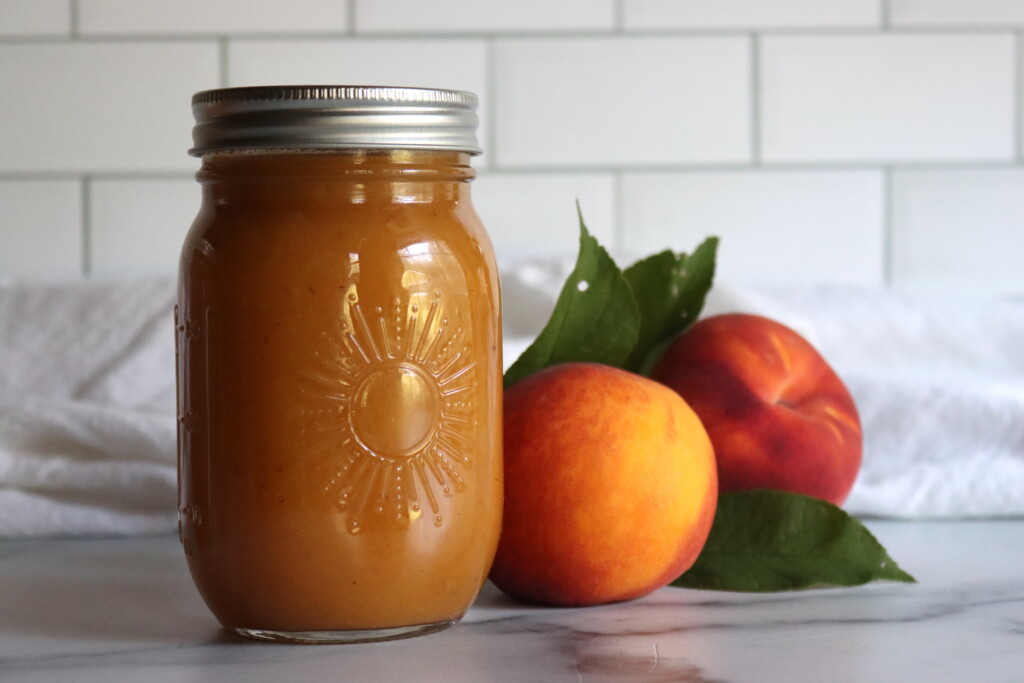
Peach nectar is a smooth, pourable preserve that’s perfect for sipping as-is or using in mixed drinks, glazes, and desserts. It’s a bit thicker than juice, made by pureeing cooked peaches with a bit of water, and (optionally) sweetening to taste. This is a flexible, forgiving preserve—and a great way to put up a batch of ripe yellow peaches.
We make peach nectar every summer when the seconds boxes at our local organic coop start overflowing. It’s a good use for slightly bruised or overripe fruit, since you’ll be cooking and pureeing it anyway. As long as they’re yellow-fleshed peaches, they’ll work just fine. White peaches aren’t acidic enough for canning, so stick with yellow varieties only.
The process is straightforward: cook the peaches, puree, reheat, and can. You can sweeten it to taste after pureeing, or leave it unsweetened if your fruit is already plenty sweet. Either way, the result is a shelf-stable fruit nectar that tastes like pure summer sunshine.
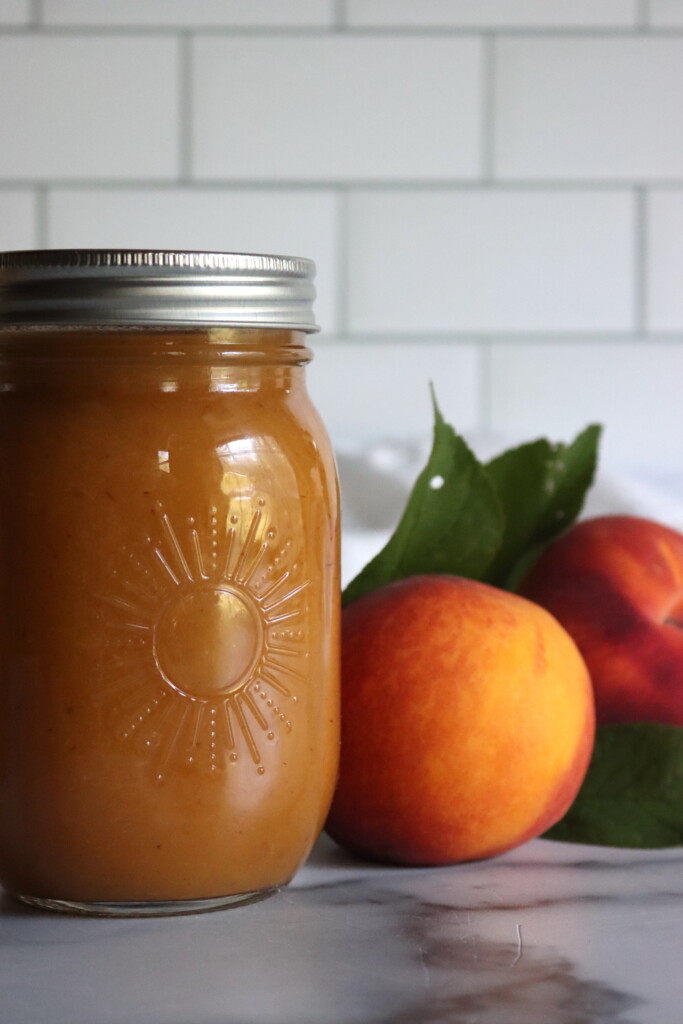
A Quick Look at the Recipe
- Recipe Name: Peach Nectar
- Recipe Type: Juice, Nectar and Puree
- Canning Method: Waterbath Canning
- Prep Time: 15 Minutes
- Cook Time: 15 Minutes
- Canning Time: 15 Minutes
- Yield: 5 to 6 Pints
- Jar Sizes: Half Pint, Pint or Quart
- Headspace: ¼ inch
- Ingredients Overview: Just Peaches and water, with optional sugar, lemon or spices
- Recipe Source: Tested recipe from the Ball Blue Book and Bernardin
- Difficulty: Easy
Ingredients
A pound of peaches as purchased yields slightly more than a pint of peach nectar. Feel free to increase or decrease this recipe to suit your needs, but keep the peach to water ratio the same.
- 5 lbs yellow peaches (as purchased)
- 3 cups water
- Sugar to taste (optional)
- Optional: 1–2 Tbsp fresh lemon juice for brightness (not needed for safety)
If you start with about 5 pounds of whole peaches, this will yield around 4 to 4¼ pounds of peeled and pitted fruit. That’s enough for about 5 to 6 pints of finished peach nectar.
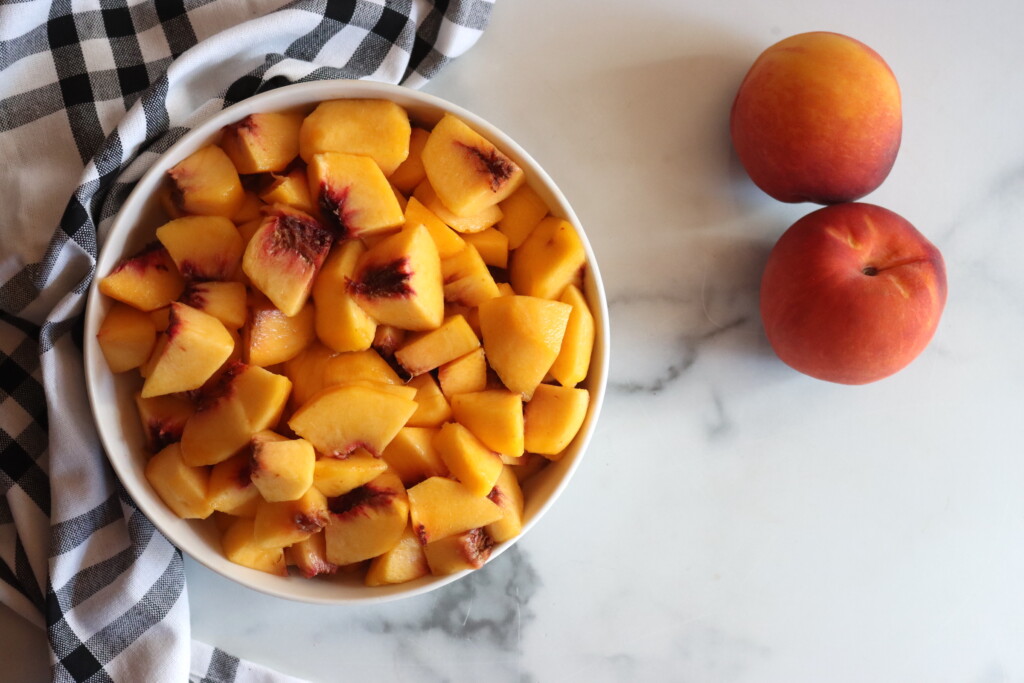
Peeling is optional, but highly recommended. The peels of peaches don’t break down in cooking (unlike the peels of nectarines or apricots). If you choose not to peel the peaches, I’d recommend straining the finished puree through dampened cheesecloth to get a smoother nectar.
As to the water, I know that sounds like quite a bit, but the nectar really does need it. Without the water it comes out very thick, more like peach butter. That’s delicious too, but not quite the same thing.
Preparing the Peaches
Wash the peaches thoroughly. You can peel them by hand, which is my preference because I’m fast and efficient with a paring knife, but most people peel them by flash blanching them in boiling water. Just dunk whole peaches in boiling water for 30–60 seconds, then transfer to an ice bath. The skins should slip right off.
I have detailed instructions with step by step pictures on peeling peaches in my post on canning peaches in syrup if you’d like more details.
Remove the pits and coarsely chop the peeled fruit. Place the peaches in a stock pot or saucepan with about 3 cups of water and bring to a gentle boil. Cover and simmer for 10 to 15 minutes, until the peaches are soft and mash easily.
Making Peach Nectar
Once the peaches are soft, puree the mixture using an immersion blender right in the pot, or transfer in batches to a countertop blender. If you prefer a slightly rustic texture, you can run them through a food mill instead. For the smoothest result, stick with a full puree.
Most peach nectar is left unstrained, but you can pass it through a few layers of damp cheesecloth if you want a thinner juice-like consistency. It’s really a matter of preference. If you strain it, your yield will obviously be a bit less.
At this point, taste your nectar. If it needs a little something, stir in sugar to taste (I usually don’t add more than a tablespoon or two per quart, if at all). You can also add a splash of lemon juice for brightness.
(Lemon juice isn’t required for canning safety, so feel free to use fresh lemon juice if you’d like for better flavor.)
Return the puree to the stove and bring it back to a full boil before canning.
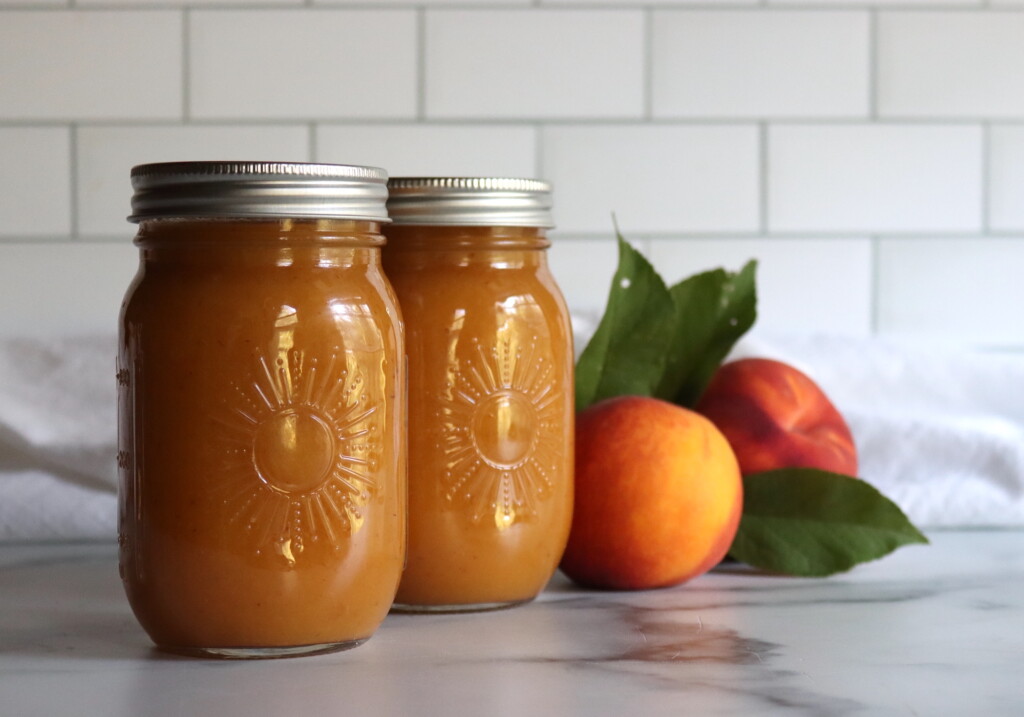
Canning Instructions
Before you begin, make sure your water bath canner, jars, and lids are prepared and ready to go. Once the peach nectar is boiling hot, carefully ladle it into prepared jars, leaving ¼ inch headspace.
Wipe the rims clean, apply two-piece lids, and tighten to fingertip-tight.
Process the jars in a boiling water bath canner based on your elevation:
- 15 minutes at elevations below 1,000 feet
- 20 minutes between 1,000 and 6,000 feet
- 25 minutes above 6,000 feet
The times are the same for half pints, pints and quarts.
After processing, remove the jars from the canner and let them sit undisturbed for 12 to 24 hours. Once sealed, the jars can be stored in a cool, dark pantry for up to 18 months.
Yield Notes
1 pound of peaches = about 2½ cups chopped or 3 cups sliced. After peeling and pitting, 5 pounds of peaches usually yields around 10 to 11 cups chopped fruit, or 4 to 4 ¼ pounds prepared fruit, which becomes about 5 to 6 pints of finished nectar depending on water content and final thickness.
Adding sugar after pureeing will slightly increase your yield. Don’t worry if your yield is a little more or less—it depends on how juicy your peaches are and how long you simmer them before pureeing.
Peach Nectar Tips
- Only use yellow-fleshed peaches. White peaches are lower in acid and not safe for water bath canning, even in blended or juiced form.
- Optional sugar can be added to taste after pureeing. Start with 1 to 2 tablespoons per quart and adjust from there. Some recipes have as much as 1 cup sugar to 5 lbs peaches, but that comes out too sweet for my tastes.
- Spices are optional, and I like this nectar sweet and pure as it is. If you want a warmer flavor, try adding a pinch of cinnamon or nutmeg, and a few drops of vanilla or almond extract is nice too. A little goes a long way, so start small.
- Don’t skip the boil after pureeing. Reheating ensures safe processing temperatures and avoids siphoning during canning.
Peach Canning Recipes
FAQ
No, white-fleshed peaches are not safe for canning because they’re low in acid. Always use yellow peaches for peach nectar recipes if you plan to preserve them using a water bath canner. If you’re unsure of the variety, err on the side of caution and freeze instead.
Adding sugar is optional and based on your personal taste. You can add no sugar at all, or stir in anywhere from 1 Tbsp to 1 cup after the fruit is pureed. The sugar doesn’t affect safety, just sweetness and flavor.
Yes, peach nectar freezes well. Just ladle the hot or cooled nectar into freezer-safe containers, leaving at least 1 inch headspace to allow for expansion. Store in the freezer for up to 12 months.
Straining is optional. Most people don’t strain peach nectar, as it’s meant to be thick and pulpy—similar to a smoothie. If you prefer a thinner texture, you can pour it through cheesecloth or a fine mesh sieve.
Yes, you can double or triple the batch, as long as your pot is big enough to handle the volume. Just make sure you still have room to safely simmer and puree the peaches without splashing or boiling over.
Serving Ideas
Peach nectar is delicious chilled straight from the fridge, or try it:
- Mixed with sparkling water for a homemade soda
- In place of orange juice in cocktails
- Stirred into iced tea
- As the base for peach popsicles or sorbet
- Glazed over grilled pork or chicken
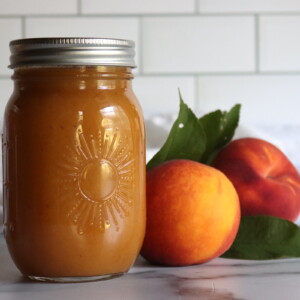
Peach Nectar
Equipment
Ingredients
- 5 lbs peaches, yellow peaches, not white, as purchased
- 3 cups water
- Sugar to taste, optional
- fresh lemon juice, optional, for flavor, not required for safety
Instructions
- Prepare the canning setup: Prepare pint or quart jars and prepare a boiling water bath canner. Keep jars hot until ready to use.
- Peel and pit the peaches: Wash fruit thoroughly. Blanch in boiling water for 30–60 seconds, transfer to an ice bath, and peel. Remove pits and coarsely chop the fruit.
- Cook the peaches: Add chopped peaches and 3 cups water to a large stock pot. Cover and bring to a boil. Simmer for 10 to 15 minutes, until the fruit softens and breaks apart easily.
- Puree: Use an immersion blender to puree the fruit directly in the pot. Alternatively, blend in batches using a countertop blender. You can also use a food mill for a more rustic texture.
- Optional straining: For a smoother juice-like consistency, strain the puree through dampened cheesecloth. Most peach nectar is not strained.
- Sweeten to taste: Return the puree to the pot and taste. Stir in sugar and lemon juice, if using. Heat the mixture back to a full rolling boil.
- Jar the nectar: Ladle hot peach nectar into prepared jars, leaving ¼ inch headspace. Wipe rims, apply lids, and tighten to fingertip-tight.
- Process Jars in boiling water bath for 15 minutes, adjusting for altitude if above 1,000 feet in elevation (see notes).
- Cool and store: Let jars sit undisturbed for 12–24 hours. Check seals, label, and store in a cool, dark pantry for up to 18 months.
Notes
Altitude Adjustments
Process the jars in a boiling water bath canner based on your elevation:- 15 minutes at elevations below 1,000 feet
- 20 minutes between 1,000 and 6,000 feet
- 25 minutes above 6,000 feet
Nutrition
Nutrition information is automatically calculated, so should only be used as an approximation.
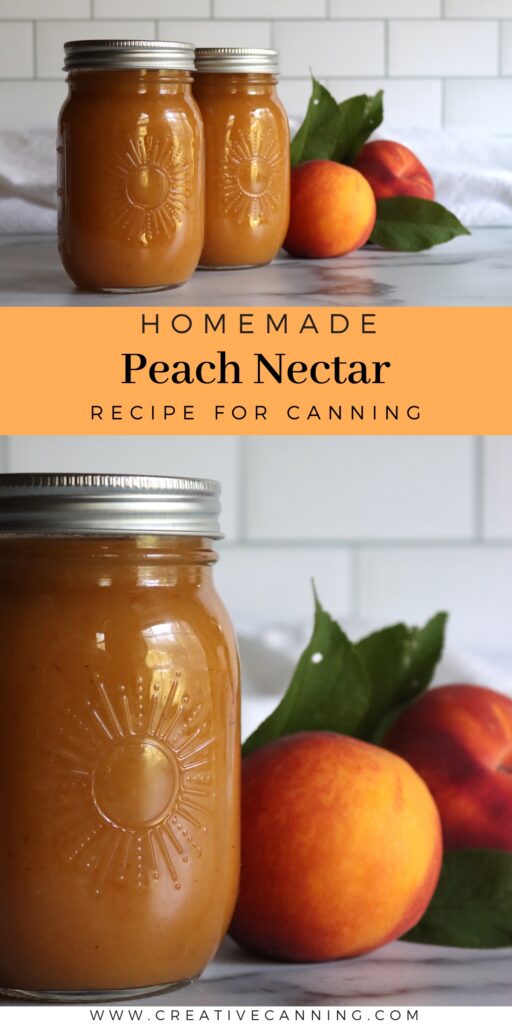
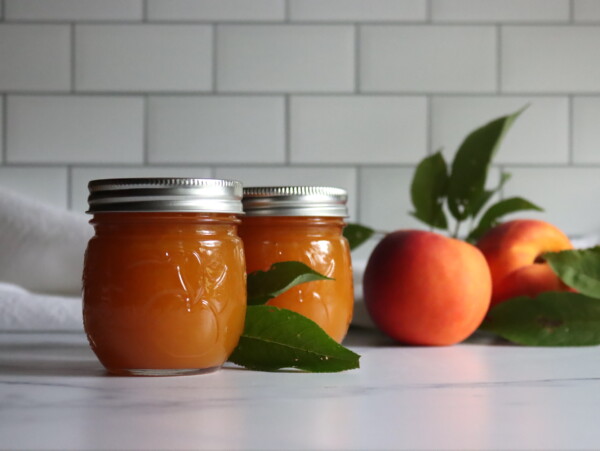
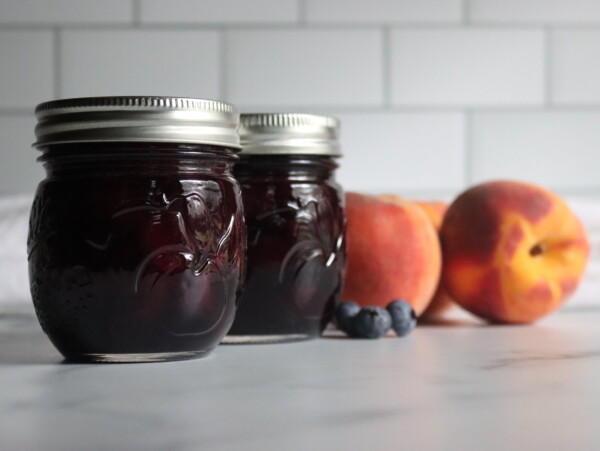
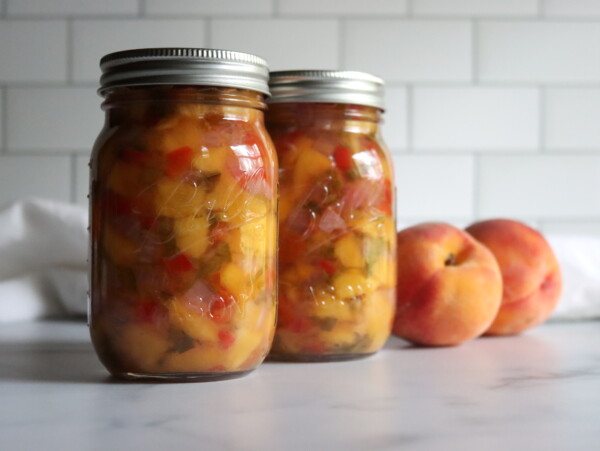
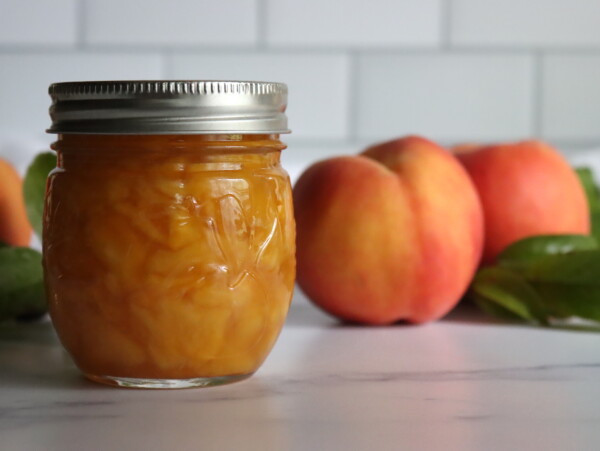
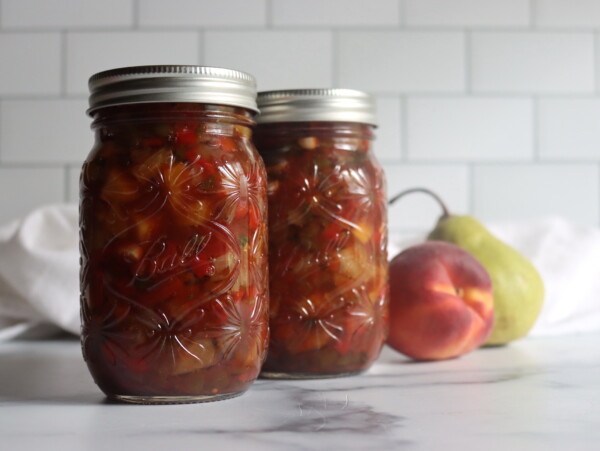
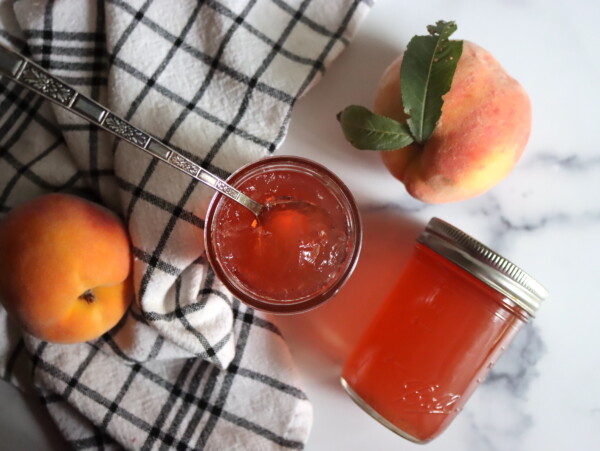
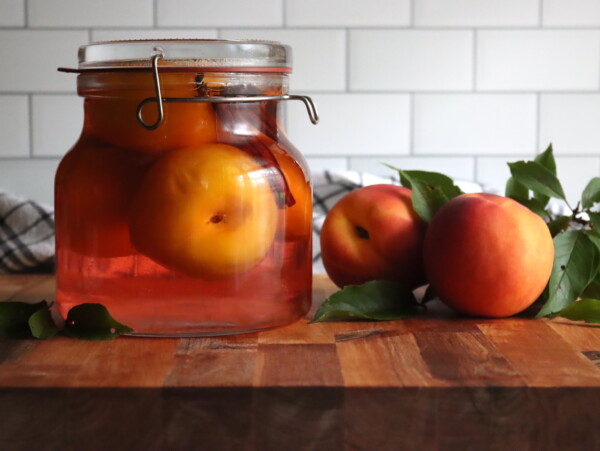
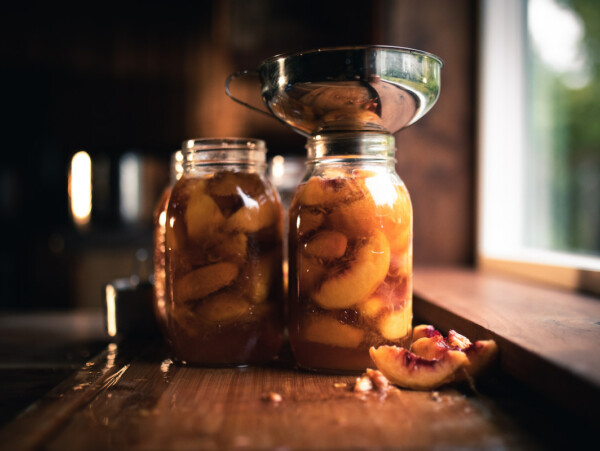
Sweet and peachy, my kids love this peach nectar. You can drink it as is, but they love it in smoothies. If I have extra at the end of the year, I open a few jars and cook this down a bit further with sugar to make peach butter too!